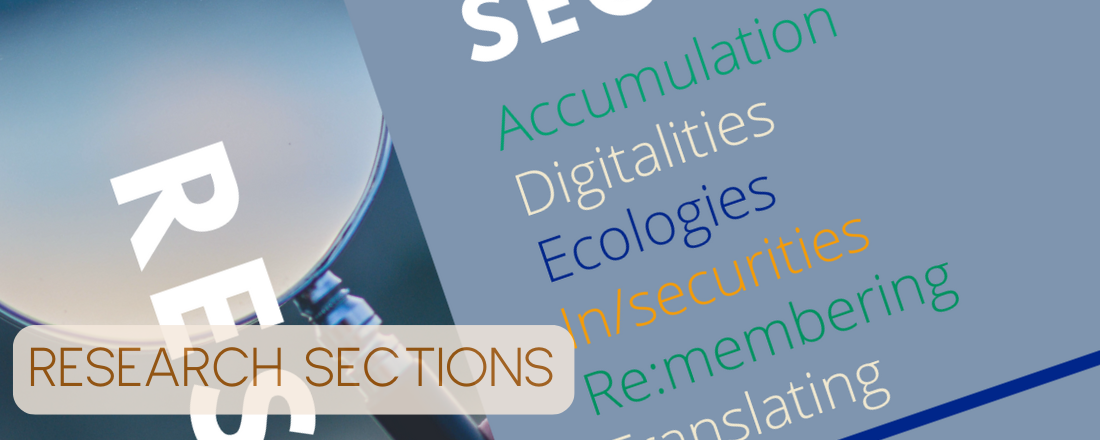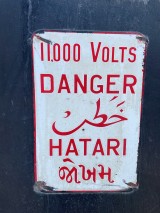We will pursue our research in six new Research Sections: Accumulation, Digitalities, Ecologies, In/securities, Re:membering, and Translating. Led by the Principal Investigators and the Key Researchers, the Research Sections are the organisational framework within which Cluster members will conduct joint research projects across academic disciplines and Cluster locations. The six Sections are the fruit of collaborative work involving over 80 scholars from all five Cluster locations, reflecting our reconfigured structure in practice.
The Research Sections will design and conduct synergetic research projects that apply the Cluster’s key concepts to our agenda of world(s) and world-making. Special incentives will be given to cross-cutting projects that explore the overlaps and intersections between Sections.
As core organisational structures for research, the Research Sections will be represented in the Academic Committee, the Cluster’s main decision-making body. At regular intervals, the Academic Committee will solicit proposals for research projects from the Research Sections. These will be vetted by an evaluation panel convened by the Cluster’s Advisory Board.
Overview
Wealth inequalities have moved to the centre of global societal debates over the past years, complementing more established debates on income inequalities (Chancel et al., 2022). While income remains an important dimension of inequality, wealth raises deeper economic and political issues, as it can produce income (e.g., rent); it materialises as a concrete asset whose ownership rests on the exclusion of others; and, over time, allows for the transfer of economic and often political power, via inheritance mechanisms. While many African economies have experienced strong growth patterns since the 2000s, they have likewise seen rising inequalities related to ownership of, and access to the means that constitute wealth – e.g. natural resources, land, housing, financial assets, etc. (Obeng-Odoom, 2015). ...more
Overview
With their promises of development and technoscientific modernity, digital technologies and artificial intelligence (AI) offer new ways of self-expression, political organising and social relations that, in turn, inflect protest movements, revive cultural heritage and catalyse industrial and economic innovation. In this RS we will build on critical analytical frameworks in African Studies to closely investigate material aspects and practices of digitalisation, including their implications for society at large. These material aspects include the labour required to mine minerals and maintain algorithmic systems, the extraction of data from people and environments, and the dumping of electronic waste....more
Overview
While RS Ecologies is to be anchored in Ecology, our inter- and transdisciplinary work will expand beyond this disciplinary boundary to include more pluralistic research, towards the theoretical, methodological and practical reconfiguration of Environmental Studies in Africa. Thus, given their centrality to the histories, identities, livelihoods and futures of people on the African continent, this RS will address not only the contemporary Africa-specific dynamics of global environmental crises, but also their histories of embeddedness in colonial and postcolonial structures....more
Overview
In an emerging new world (dis)order, Africa is a key site of global contests. Multiple networks of African political actors, multinational businesses, transcontinental religious communities, security agencies, vigilante groups and social movements concurrently claim access to, and control over, land, resources, political systems, cultural orientations and recognition. New configurations of actors and technologies are coming to the fore in processes that challenge existing knowledge, hierarchies, and relations of domination. Via digital connections, these resonate with reconfigurations elsewhere, entangling African everyday life-worlds and histories with assemblages of global struggles that make it increasingly difficult to decipher what is going on, let alone what it may lead up to. ...more
Overview
Over the last few years, the struggle over memory and heritage – determining what to remember and celebrate or to forget and condemn – has gained new strength from both within and outside of Africa. On the continent, the ‘Rhodes Must Fall’ movement in South Africa (2015); the construction of huge monuments and statues dedicated to Africanness; the (re)naming of bridges, airports and highways after former or present political figures; the constant reshaping of the pantheon of national heroes in many African countries, and the impact of the digital turn on both individual and collective memory regimes have created a new momentum. Elsewhere, debates on the restitution of artefacts, such as the Benin Bronzes (2022), or the renaming of streets in Bordeaux or Berlin have brought tensions inherent in the long-shared colonial history of Africa and Europe to the attention of a wide international public....more
Overview
Understood in the sense of conveying meaning across or between languages, translating fundamentally constitutes and characterises both the multilingual life-worlds that we in African Studies address, as well as the everyday work and cooperation of our Cluster itself. In RS Translating we will study not only these language-related aspects, but also the production and circulation of concepts, policies and practices within and between multilingual contexts as processes of translating...more














